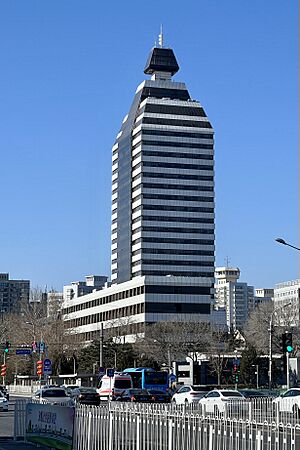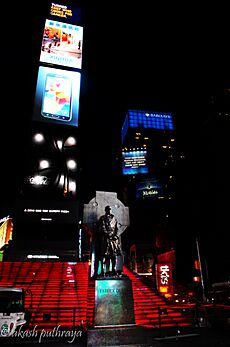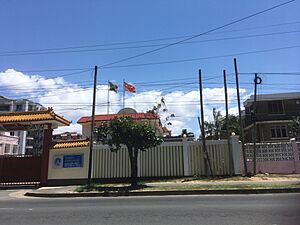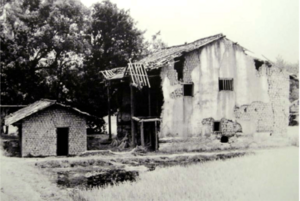Xinhua News Agency facts for kids
 |
|

Xinhua headquarters office in Beijing
|
|
|
Native name
|
新华通讯社
|
|---|---|
|
Formerly
|
Red China News Agency (1931–1937) |
| State news agency | |
| Industry | |
| Founded | November 1931, in Ruijin, Jiangxi, Chinese Soviet Republic |
| Founder | Chinese Communist Party |
| Headquarters | |
|
Area served
|
Worldwide |
|
Key people
|
|
| Owner | People's Republic of China (state-owned institution) |
|
Number of employees
|
10,000+ |
| Parent | State Council of the People's Republic of China |
| Subsidiaries | Reference News China Xinhua News Network Corporation CNC World |
| Xinhua News Agency | |||||||||||
|---|---|---|---|---|---|---|---|---|---|---|---|
| Simplified Chinese | 新华通讯社 | ||||||||||
| Traditional Chinese | 新華通訊社 | ||||||||||
| Literal meaning | New China News Agency | ||||||||||
|
|||||||||||
| Abbreviated name | |||||||||||
| Simplified Chinese | 新华社 | ||||||||||
| Traditional Chinese | 新華社 | ||||||||||
| Literal meaning | New China Agency | ||||||||||
|
|||||||||||
Xinhua News Agency (English pronunciation: /ˌʃɪnˈhwɑː/), or New China News Agency, is the official state news agency of the People's Republic of China. It is a State Council's ministry-level institution, and was founded in 1931. It is the largest media organ in China.
Xinhua is a publisher, as well as a news agency; it publishes in multiple languages and is a channel for the distribution of information related to the Chinese government and the ruling Chinese Communist Party (CCP). Its headquarters in Beijing are located close to the central government's headquarters at Zhongnanhai.
Xinhua tailors its pro-Chinese government message to the nuances of each international audience. The organization has faced criticism for spreading propaganda and disinformation and for criticizing people, groups, or movements critical of the Chinese government and its policies.
Contents
History

The predecessor to Xinhua was the Red China News Agency (Chinese: 紅色中華通訊社; pinyin: Hóngsè Zhōnghuá Tōngxùnshè), founded in November 1931 as the Chinese Soviet Zone of Ruijin, Jiangxi province. It mostly republished news from its rival Central News Agency (CNA) for party and army officials. The agency got its name of Xinhua in November 1935, at the end of the Long March, in which the Chinese Red Army retreated from Jiangxi to Shaanxi. By the outbreak of the Second Sino-Japanese War in 1937, Xinhua's Reference News translated CNA news from the Kuomintang, and also international news from agencies like TASS and Havas. Xinhua first started using letterpress printing in 1940.
During the Pacific War the agency developed overseas broadcasting capabilities and established its first overseas branches. It began broadcasting to foreign countries in English from 1944. In 1949, Xinhua followed a subscription model instead of its previous limited distribution model. In the direct aftermath of the Chinese Civil War, the agency represented the People's Republic of China in countries and territories with which it had no diplomatic representation, such as British Hong Kong. In 1956, Xinhua began reporting on anti-Marxist and other opinions critical of the CCP. In 1957, Xinhua switched from a journal format to a newspaper format.
The agency was described by media scholars as the "eyes and tongue" of the CCP, observing what is important for the masses and passing on the information. A former Xinhua director, Zheng Tao, noted that the agency was a bridge between the CCP, the government, and the people, communicating both the demands of the people and the policies of the Party.
In 2018, the United States Department of Justice directed Xinhua's U.S. branch to register as a foreign agent under the Foreign Agents Registration Act. In 2020, the United States Department of State designated Xinhua and other state-owned media outlets as a foreign mission. Xinhua registered in the U.S. as a foreign agent in May 2021.
In June 2022, Fu Hua, the former CCP Committee Secretary of Beijing Daily, was appointed president of Xinhua. In September 2022, Fu stated, "Xinhua will never depart from the party line, not even for a minute, nor stray from the path laid down by General Secretary Xi Jinping".
Reach
By 2021, Xinhua had 181 bureaus globally, publishing news in multiple languages. Xinhua is also responsible for handling, and in some cases, censoring reports from foreign media destined for release in China. In 2010, Xinhua acquired prime commercial real estate on Times Square in Manhattan and started an English-language satellite news network. Xinhua has paid other media outlets such as The New York Times, The Washington Post, and The Wall Street Journal to carry its advertorial inserts, branded as "China Watch" or "China Focus".
Internal media
The CCP's internal media system, in which certain journals (neican) are published exclusively for government and party officials, provides information and analysis which are not available to the public. Xinhua produces reports for these internal journals that contain information that the CCP considers too sensitive for public consumption and can pertain to subjects for security and intelligence purposes.
Xinhua reporters file certain internal reports to CCP leadership from secure rooms in some Chinese embassies. Informed observers note that journalists generally like to write for the internal publications because they can write less polemical and more comprehensive stories without making the omissions of unwelcome details commonly made in the media directed to the general public. The internal reports, written from a large number of countries, typically consist of in-depth analyses of international situations and domestic attitudes towards regional issues and perceptions of China.
The Chinese government's internal media publication system follows a strict hierarchical pattern designed to facilitate party control. A publication called Reference News—which includes translated articles from abroad as well as news and commentary by Xinhua reporters—is delivered by Xinhua personnel, rather than by the national mail system, to officials at the working level and above. A three-to-ten-page report called Internal Reference (Neibu Cankao) is distributed to officials at the ministerial level and higher. One example was the first reports on the SARS outbreak by Xinhua which only government officials were allowed to see. The most classified Xinhua internal reports are issued to the top dozen or so party and government officials.
Headquarters and regional offices

Xinhua headquarters is located in Beijing, strategically located near Zhongnanhai, which houses the headquarters of the CCP, the General Secretary, and the State Council. Xinhua established its first overseas affiliate in 1947 in London, with Samuel Chinque as publisher. It distributes its news from the publication's overseas headquarters in New York City, in conjunction with distributing coverage from the United Nations bureau, as well as its other hubs in Asia, Middle East, Latin America, and Africa.
As of 2024, Xinhua has over 170 overseas bureaus.
Hong Kong
Xinhua's branch in Hong Kong was not just a press office, but served as the de facto embassy of the PRC in the territory when it was under British administration. It was named a news agency under the special historic conditions before the 1997 handover, because the People's Republic did not recognize British sovereignty over the colony, and could not set up a consulate on what it considered to be its soil. In the early 1980s, the deputy secretary of Xinhua, Wong Man-fong, negotiated with Hong Kong-based triads on behalf of the Chinese government to ensure their peace after the handover of Hong Kong.
Despite its unofficial status, the directors of the Xinhua Hong Kong Branch included high-ranking former diplomats such as Zhou Nan, former Ambassador to the United Nations and Vice-Minister of Foreign Affairs, who later negotiated the Sino-British Joint Declaration on the future of Hong Kong. His predecessor, Xu Jiatun, was also vice-chairman of the Hong Kong Basic Law Drafting Committee, before fleeing to the United States in response to the 1989 Tiananmen Square protests and massacre, where he went into exile.
It was authorized by the special administrative region government to continue to represent the central government after 1997, and it was renamed "The Liaison Office of the Central People's Government in the Hong Kong SAR" on 18 January 2000, retaining branch chief Jiang Enzhu as inaugural director.
Cairo
Xinhua opened its Middle East Regional Bureau in Cairo, Egypt in 1985.
Cooperation with other media outlets
In 2015, Xinhua and other Chinese state media outlets signed cooperation and content-sharing agreements with Russian state media outlets.
In November 2018, Xinhua News Agency and the Associated Press (AP) of the United States signed a memorandum of understanding to expand cooperation. Some lawmakers in the US congress asked the AP to release the text of its memorandum of understanding with Xinhua. In response, AP spokeswoman Lauren Easton told The Washington Post that AP's agreement with Xinhua is to allow it to operate inside China and has no bearing on AP's independence, and that Xinhua has no access to AP's sensitive information and no influence over AP's editorial decisions.
In December 2022, journalist Joshua Kurlantzick said that Xinhua has had more success than other Chinese state media outlets such as China Global Television Network and China Radio International in acting as a part of China's media offensive, with Xinhua having signed content sharing agreements with many news agencies around the world. He noted that "unlike with, say, a television station that a viewer has to actively turn on, and probably knows the channel, most print or online readers do not check the bylines of news articles—making it easier for Xinhua copy to slip through to readers." He also noted: "In developing countries, Xinhua is increasingly stepping into the void left by other news wires like the Associated Press, because Xinhua content is free or cheap", and warned about Xinhua content being used by local news outlets in countries such as Thailand, saying: "Readers don't really notice where it comes from. That's going to skew the views of the general reading public, and that's quite dangerous."
See also
 In Spanish: Xinhua para niños
In Spanish: Xinhua para niños
- Mass media in China
- Propaganda in China
- China Xinhua News Network Corporation
- Xinhua–Sogou AI news anchor


